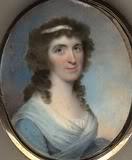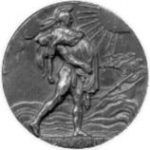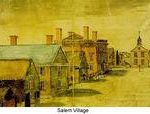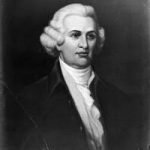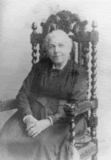Inspired by the Boston Tea Party, Barker organized a protest of her own in Edenton, North Carolina. Tired of taxation without representation by the British, she went door to door, inciting women of the town to support a boycott of English tea and other products. At the Edenton Tea Party on October 25, 1774, Barker and fifty other women signed a protest statement.
Penelope Pagett was born on June 17, 1728, in Edenton, North Carolina, to Elizabeth Blount and Dr. Samuel Pagett. Her father’s death, quickly followed by her sister’s death, thrust adult responsibilities on the girl. While still a teen, Penelope became a mother to Elizabeth’s two children and took over management of the family plantation.
Poor Penelope had very bad luck with her men. She married John Hodgson in 1745. She was pregnant with their second child when John died, leaving her with four children to raise. The one bright spot was the large amount of property she inherited from her husband. Widows in colonial times normally received only one-third of their husband’s estates, just enough to serve as dowry to ensure their remarriage.
Rich, beautiful, and widowed at nineteen, Penelope had no shortage of suitors, and in 1752 she married James Craven, a wealthy planter and politician. His untimely death two years later left her a widow again. But since he had no other heirs, she inherited all of his estate, making her the richest woman in North Carolina.
In 1757, Penelope married a third time, this time to a prominent lawyer, Thomas Barker – she was 28 and he was 44. The couple had three children, but all died before their first birthdays.
Thomas sailed to London in 1761 to serve as agent for the North Carolina Colony, and became stranded there because of the British blockade of American ships. He did not return home until 1778. For seventeen years, Penelope again singlehandedly managed the family and the property. It was during this time that she became involved in politics.
Tired of the British taxing the colonists while not letting them have a say in the government – taxation without representation – Penelope wrote a public statement in which she endorsed a boycott of tea and other British products, such as cloth.
In the early fall of 1774, Penelope Barker visited more fifty homes, and invited the ladies to a very special tea party to be held at the home of Mrs. Elizabeth King On October 25, 1774. At the party, she encouraged her neighbors and friends to stop drinking English tea and using English products until the King repealed the tea tax.
Penelope said, “Maybe it has only been men who have protested the king up to now. That only means we women have taken too long to let our voices be heard. We are signing our names to a document, not hiding ourselves behind costumes like the men in Boston did at their tea party. The British will know who we are.”
The Edenton Tea Party, as it came to be called, is believed to be the first political action by women in the American colonies – ten months after the famous Boston Tea Party was organized by men. Penelope Barker and 50 other women became the signers of the Resolutions of the Edenton Tea Party. This document is the first purely political action by women in the American Colonies.
They signed the resolution to show their support of North Carolina’s Provisional Assembly:
As we cannot be indifferent on any occasion that appears nearly to affect the peace and happiness of our country, and as it has thought necessary, for the public good, to enter into several particular resolves by a meeting of Members deputed from the whole Province, it is a duty which we owe, not only to our near and dear connections who have concurred in them, but to ourselves who are essentially interested in their welfare, to do everything as far as lies in our power to testify our sincere adherence to the same: and we do therefore accordingly subscribe this paper, as a witness of our fixed intention and solemn determination to do so.
Penelope sent the proclamation to a London newspaper, confident that the women’s stance would cause a stir in England. British journalists and cartoonists depicted the women in a negative light, as bad mothers and loose women, but the Patriots in America praised the women for their stance. Women in other colonies followed her lead and began boycotting British goods.
Instead of English tea, the women brewed herbal teas from rosemary, lavender, thyme, chamomile, sage, mint, and lemon balm. American tea was also made from raspberry leaves and stalks of whorled loosestrife plant. Liberty Tea often included red rose petals, linden blossoms, elder, red clover, violets and goldenrod. Special flavor additions came from sassafras, willow tree bark, the twigs of sweet gum, fennel and dill seeds, and the fruits of the rosebush, called rosehips. Liberty tea remained popular even after the British tea taxes were no longer an issue.
Penelope Barker took a great risk in leading the protest, not only because she and her husband were prominent property owners in North Carolina but also because her husband was an agent of the British crown.
Thomas Barker returned to Edenton in 1778, and he and Penelope built the Barker House in 1782. It was a story and a half side-hall house. It had several additions by the 1840s which made it the size it is today.
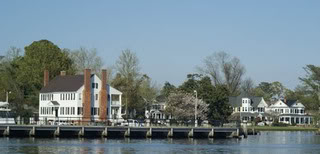
Image: The Barker House
Edenton, North Carolina
Thomas and Penelope Barker built this house in 1782, and it originally consisted of a parlor wing, and pocket doors separated the double parlors. The house has three floors and eight fireplaces, had three additions between 1782 and the 1840s.
Thomas Barker died in 1789, and left Penelope all his property which included town lots, two plantations, 33 mahogany chairs, 53 slaves, watches, horses, and 400 books.
Penelope Pagett Hodgson Craven Barker died in 1796, at the age of 66. She was a rare colonial woman because she managed her own affairs. She had borne five children, raised four others, and outlived all but one. Penelope and Thomas Barker were buried at the Johnston family graveyard at Hayes Plantation near Edenton.
Penelope’s famous tea party is remembered with a huge bronze teapot mounted on a cannon west of Village Green. It has become a symbol of Edenton and its revolutionary women.
SOURCES
Penelope Barker
Barker House Facts
Penelope Barker: First American Woman Political Activist
